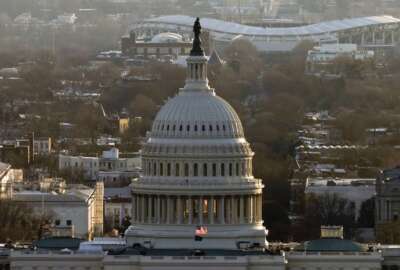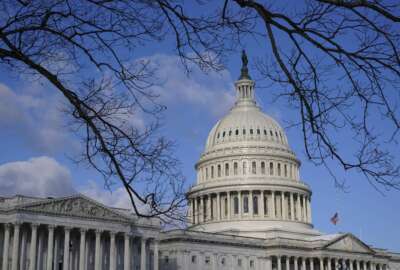A fed’s guide to the congressional blitz ahead
Will Congress pass a continuing resolution? Will Republicans try to block a 1 percent pay raise for feds? Federal News Radio tells you what to watch for as...
Congress returns to Washington for a busy two weeks before calling it quits again. Lawmakers must pass a bill to keep the government funded beyond Sept. 30, the end of the fiscal year. Other critical legislation, including the defense authorization act, may have to wait until after the November elections.
The House is expected to take up a continuing resolution this week, with the Senate to follow next week. Congress is likely to pass some sort of funding mechanism to keep the government operating.
“It’s a kick-the-ball-down-the-road strategy,” Rep. Chris Van Hollen (D- Md.) said. “Most of the discussion has been around a continuing resolution that would last until late November or early December. Then Congress would convene after the November mid-term elections and, at that point in time, work on appropriations bills.”
Continuing resolutions largely maintain the status quo, but not all the time in every respect.
“The question is whether there are going to be riders on the continuing resolution that will weigh it down and make it harder to pass, either on the Democratic or the Republican side. That’s unclear at this time,” Rep. Gerry Connolly (D-Va.) said. “The CR has to fund the government at adequate levels, and we’re probably going to fight about what those adequate levels are.”
“These two weeks are going to be very challenging,” he added.
It’s not clear how long the continuing resolution would last. With five Democratic senators retiring this year, Republicans have a good chance to take over the upper chamber in November. For that reason, the GOP is unlikely to support anything more than a short-term fix now.
And there’s the chance that some unrelated controversy could lead conservative Republicans to call for another government shutdown. Rep. Steve King (R-Iowa) has suggested a shutdown over President Barack Obama’s immigration policy, according to the Des Moines Register.
While lawmakers’ attention will be focused on government funding, it’s not the only issue that will bubble up.
Lingering questions
- Will Congress block a pay raise for feds?
While Congress was away, President Obama proposed a 1 percent pay raise for federal employees. It will take effect on Jan. 1, unless Congress moves to block it.
Connolly has co-sponsored legislation to boost federal pay by 3.3 percent. “I would hope we might consider that, but I don’t hold out a lot of hope because I don’t think the Republicans are even necessarily receptive to the 1 percent being advocated by the President,” he said, adding that there is the possibility lawmakers may try to thwart the pay raise.
- Whom will the Senate confirm?
The Senate will vote on some presidential nominees this week and next. But it’s not clear whether Carolyn Colvin, the acting head of the Social Security Administration, will be among them. Anne Rung, the president’s pick to lead the Office of Federal Procurement Policy, also waits in the wings.
- Will Congress make it easier for agencies to fire federal executives?
In a sweeping law to address scandals at the Veterans Affairs Department, Congress included a measure to make it easier for Secretary Bob McDonald to fire career senior executives. The House Oversight and Government Reform Committee approved in July a bill to streamline the process for dismissing Senior Executive Service members throughout the government.
The House has not voted on the measure.
Should it come to the floor, Connolly says he’ll oppose it.
“I think that would be quite disruptive to management and our ability to recruit new talent. We are now hemorrhaging federal employees,” he said.
- What will happen to the Export-Import Bank?
The Ex-Im Bank would not close its doors on Oct. 1, should Congress fail to pass a bill to reauthorize the small agency. But the bank would not approve new transactions, according to bank officials. Current transactions would not be affected.
House Republicans are divided on the future of the bank, which provides financial services to U.S. exporters. During congressional hearings, House Financial Services Chairman Jeb Hensarling (R-Texas) has accused the bank of “crony-based lending practices.” Other Republicans see the bank as a tool to help U.S. businesses.
This is not the first time the Ex-Im Bank has been a political football. In 2012, Congress overwhelming approved reauthorization, despite a similar tussle. But in an election year, the agency’s future is more cloudy.
- What about all that talk about streamlining federal IT?
Before the break, there was a lot of talk about FITARA, a House bill to overhaul the way the government buys and manages information technology. The House passed it. A similar measure has passed a Senate committee.
Connolly, who co-sponsored the legislation, is hoping the Senate will tack a version of its bill onto defense authorization legislation, which traditionally has passed Congress. He says he is pushing for that to happen in the next two weeks, but acknowledges it may have to wait until after the November elections.
RELATED STORIES:
Obama calls for 1 percent pay increase for feds starting Jan. 1
SSA nominee seeks to mend labor-management fences
Copyright © 2025 Federal News Network. All rights reserved. This website is not intended for users located within the European Economic Area.





